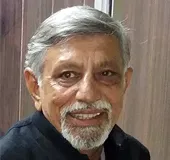
The United States announces in multiple forums that it is seeking greater cooperation with India in the strategic defence sector. In a meeting on the sidelines of the G20 ministerial conference, Minister of State, External Affairs, Gen. V.K. Singh and US Deputy Secretary of State John Sullivan reaffirmed the strong US-India strategic partnership and India’s status as a major defence partner of the US. The statement issued by the US also read: “We want India to help us more with Afghanistan, especially in the field of economic assistance and development.”
The two-plus-two Indo-US dialogue, involving defence and foreign affairs ministers, is scheduled for July. The US claims that the maximum military exercises it conducts with any nation is with India. It seeks to collaborate with India to counter a belligerent China. It promises to supply India with military hardware, with cutting edge technology, yet to be even provided to most of its closest allies. At the same time, it issues policy decisions on its own terms without any consideration on the strategic implications of its decisions for its allies and close strategic partners.
The US claims that the maximum military exercises it conducts with any nation is with India. It seeks to collaborate with India to counter a belligerent China.
On 2 August 2017, President Donald Trump signed into law a bill pushed through by the senate, termed Countering America’s Adversaries Through Sanctions Act (CAATSA). The bill was aimed at imposing sanctions on Iran, Russia and North Korea. The bill amongst multiple issues also imposes secondary sanctions against those transacting with Russian defence or intelligence sectors. It also impacted nations exporting pipelines to Russia.
While India has been impacted by this bill in its military procurements, including frigates, helicopters and the S-400 missile systems, the European Union (EU) has been hit by the pipeline clause. Even before the bill was signed by Trump, Germany and Austria issued a joint statement, commenting that the bill heralded a “new and very negative quality in European-American relations.” The EU President described the sanctions as illegal under international law. India has been in negotiations with the US for a waiver, which has been supported by most US advisors, including Mike Pompeo.
Recently, Trump unilaterally withdrew the US from the Iran nuclear deal, also termed as the Joint Comprehensive Plan of Action (JCPOA). This despite all other nations forming part of the agreement trying to convince him against it. Enmity between the US and Iran had always existed. US decision placed the deal at risk and could lead to Iran re-commencing its nuclear programme, leading to tensions in West Asia, which could destabilise the entire region. Other signatories of the deal decided to remain committed.
US Secretary of State Mike Pompeo, post the US withdrawal threatened to impose the ‘strongest sanctions in history’ against Iran if it did not accept a series of US demands. These included Iran giving up its nuclear ambitions, curtailing its ballistic missile programme and withdrawing all its forces from the Syrian civil war. It is very clear that Iran would never accept US terms. Thus, with others backing the deal, it may still hold, but sanctions are very likely. Iran has given the EU and others backing the deal time till 31 May 2018 to come out with a solution.
It is very clear that Iran would never accept US terms. Thus, with others backing the deal, it may still hold, but sanctions are very likely.
The other nations which have signed the deal have planned to continue with their engagements with Iran. The EU has proposed to shield their companies from US sanctions, for doing business with Iran. All EU nations backed a decision to counter US sanctions by updating a 20-year-old ‘blocking statute’ which was originally enacted to circumvent a US embargo on Cuba. This statute prohibits EU companies from complying with US sanctions and permits them to claim damages from the ‘person causing them.’
Realistically though, while it may send a strong message to the US, it may not be enforceable as the companies violating US sanctions may not be able to claim damages. The German economy minister stated to a newspaper recently that the government will help German firms with business in Iran but cannot entirely shield them from US sanctions.
The US decision would deeply impact India. India has already decided to double its oil imports from Iran in the next fiscal year. Presently, India imports 6,20,000 barrels per day from Iran. Simultaneously, its investments in the Chabahar port ($500 million) would be impacted. The development of the port, meant to be India’s gateway to Central Asia, an alternate port for Afghanistan and India’s answer to Gwadar, would be affected. China would jump into the fray at the first sign of Indian hesitation. Any delay or withdrawal from Indian side would ensure that Indian-Iranian relations would never be the same.
Trump’s announcement of ‘on summit’, ‘off summit’ with North Korea without consulting his allies have left them wondering of US’s intentions. The South vowed to continue dialogue and as per reports both leaders met again at the demilitarised zone. South Korean President Moon Jae-in stated after meeting the North Korean leader that the North is eager for the summit. John Tierney, of the Centre of Arms Control and Non-Proliferation stated: “The first rule of diplomacy is always consult your allies, yet our key allies in the region were blindsided by the move.” He added that the Trump administration has no unified diplomatic strategy.
Its unilateral decision to move its embassy from Tel Aviv to Jerusalem set West Asia on fire leading to mass deaths and injuries. Most of its allies from NATO and EU criticised its actions, but Trump bashed ahead. Under Trump, the US has withdrawn from the Paris Agreement on climate change, UNESCO and the Trans Pacific Partnership. Such unilateral actions by an individual, who visualises a different path for his nation, pushes back progress made by the international community over the years. It also indicates the unreliability of US decision making.
Trump has managed to divide the world as never before, and even his allies. His unilateral decisions including enforcing sanctions, where none were required, has raised more questions than answers. The major issue which arises and impacts many nations is finding a way through the sanctions. In the present global environment, sanctions are considered an easier alternative to employment of military force.
In the case of Iran, companies or countries continuing to pursue business with Iran, post the stipulated period when sanctions are enforced, could be barred from access to US markets apart from other punitive actions. 4 November is the possible deadline for companies to cease buying Iranian oil and conducting business in Iranian ports. The US can, however, issue waivers or simply choose not to apply these penalties.
The US’ unilateral decision to move its embassy from Tel Aviv to Jerusalem set West Asia on fire leading to mass deaths and injuries.
The fact remains that the US imposes sanctions for its own strategic reasons, without consulting its partners and allies. However, once applied, it impacts those who are uninvolved in the region for imposition of sanctions, as is the case with CAATSA, imposed for supposedly Russian interference in the last US elections or Iran, where the US feels that the deal was one-sided. This unilateral action compels its allies to seek waivers on issues which are in its own national interest. The classic example is India seeking waiver to purchase military equipment from Russia.
These actions also indicate the unreliability of the US as a strong ally. It has selfishly only considered its own interests rather than those of its partners. Hence, based on its recent actions, US allies and strategic partners need to sit together to evolve their own mechanisms for defeating US sanctions and establishing a system where such unilateral decisions are proved wrong and remain ineffective. Unless the US is hit back in a manner where it realises that without taking majority of its allies along with it, its decisions would not be successfully implemented, it would continue unashamedly.
India needs to reconsider the depth to which it is willing to engage the US in the strategic domain. Moving forward in security collaboration by opening discussions on Communications Compatibility and Security Agreement (Comcasa), should be put on hold till the issue of US sanctions not impacting Indian national interests are clarified. This does not imply that India shifts camps but ensures that the US is conveyed Indian strategic interests would not be compromised, nor would India beg for waivers, but would retaliate by not cooperating in areas where the US most desires it to. India has the strength and the economic power to do so and it should. If it does not, it would lose other close friends and allies, including Russia and Iran.
The views expressed above belong to the author(s). ORF research and analyses now available on Telegram! Click here to access our curated content — blogs, longforms and interviews.



 The United States announces in multiple forums that it is seeking greater cooperation with India in the strategic defence sector. In a meeting on the sidelines of the G20 ministerial conference, Minister of State, External Affairs, Gen. V.K. Singh and US Deputy Secretary of State John Sullivan reaffirmed the strong US-India strategic partnership and India’s status as a major defence partner of the US. The statement issued by the US also read: “We want India to help us more with Afghanistan, especially in the field of economic assistance and development.”
The two-plus-two Indo-US dialogue, involving defence and foreign affairs ministers, is scheduled for July. The US claims that the maximum military exercises it conducts with any nation is with India. It seeks to collaborate with India to counter a belligerent China. It promises to supply India with military hardware, with cutting edge technology, yet to be even provided to most of its closest allies. At the same time, it issues policy decisions on its own terms without any consideration on the strategic implications of its decisions for its allies and close strategic partners.
The United States announces in multiple forums that it is seeking greater cooperation with India in the strategic defence sector. In a meeting on the sidelines of the G20 ministerial conference, Minister of State, External Affairs, Gen. V.K. Singh and US Deputy Secretary of State John Sullivan reaffirmed the strong US-India strategic partnership and India’s status as a major defence partner of the US. The statement issued by the US also read: “We want India to help us more with Afghanistan, especially in the field of economic assistance and development.”
The two-plus-two Indo-US dialogue, involving defence and foreign affairs ministers, is scheduled for July. The US claims that the maximum military exercises it conducts with any nation is with India. It seeks to collaborate with India to counter a belligerent China. It promises to supply India with military hardware, with cutting edge technology, yet to be even provided to most of its closest allies. At the same time, it issues policy decisions on its own terms without any consideration on the strategic implications of its decisions for its allies and close strategic partners.
 PREV
PREV


